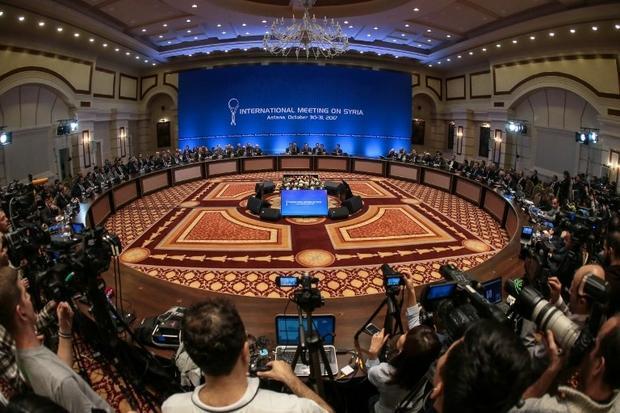
Syria’s opposition said on Dec. 21 that it was more important “than ever before” that Russia push Bashar al-Assad’s government towards a political settlement, as new peace talks kicked off in Kazakhstan.
Syria’s opposition said on Dec. 21 that it was more important “than ever before” that Russia push Bashar al-Assad’s government towards a political settlement, as new peace talks kicked off in Kazakhstan.
A new round of Syria peace talks backed by powerbrokers Russia, Iran and Turkey began on Dec. 21 in the Kazakh capital Astana as major powers seek to revive a hobbled peace process.
Delegations from Russia, Iran and Turkey along with Syrian regime representatives and a 20-strong opposition delegation had all arrived in the Kazakh capital Astana for two days of talks, a Kazakh foreign ministry spokesman said.
The U.N.’s envoy for Syria, Staffan de Mistura, is expected to attend the second day of talks on Dec. 22 after meeting with Russian Foreign Minister Sergei Lavrov in Moscow.In Astana, the Syrian delegation urged Russia to push Assad’s government towards a peace settlement.
“We are asking the Russian side, now more than ever before, to put pressure on the regime to push it towards a political settlement,” the Syrian opposition delegation said in a statement after meeting with a United Nations team.“The detainees are the priority for the military delegation. We will focus on this cause with the Russian delegation,” the statement added.The Syrian negotiators will also focus on the reinforcement of the ceasefire, especially in the de-escalation zones, as well as the lifting of sieges on all towns and villages and the delivery of assistance to those in need, the statement said.Syria’s SANA state news agency reported that Russia’s delegation had “met separately with the Iranian and Turkish delegations.”
“After the bilateral meetings, there will be a trilateral meeting between the three sponsor states,” it said.The negotiations should conclude with a plenary session involving all the parties on Dec. 22.The eighth round of talks comes after Russian leader Vladimir Putin ordered a partial withdrawal of Russian forces during a surprise visit to the war-torn country last week.Moscow has spearheaded the talks in Astana since the start of the year as it tries to turn its game-changing military intervention in Syria into a negotiated settlement.
The Kremlin also hopes to convene a political congress in the Black Sea resort of Sochi which would bring together regime officials and the opposition to reinvigorate a hobbled peace process.Kremlin spokesman Dmitry Peskov said Dec. 21 there were currently “no dates” for the Sochi congress as of yet.
“The most important thing here is preparedness. No one is trying to artificially accelerate this process,” Peskov told reporters.Since the start of Syria’s war in 2011, numerous diplomatic attempts to halt the conflict have stumbled, mainly over Assad’s future.
A fragile ceasefire brokered at the end of last year by Moscow and rebel-aligned Ankara has been bolstered somewhat by the negotiations in Astana, which began in January.Recent rounds of talks in Kazakhstan have focussed on implementing a Russia-led plan for four “de-escalation zones” to stem fighting between government and rebels.A year on from the devastating and strategically crucial regime victory in Aleppo, Damascus has consolidated control over much of the country, wresting territory from extremist factions not party to the truce, particularly Islamic State of Iraq and the Levant (ISIL).
Diplomatic contacts between the major parties in the conflict have intensified in recent months, but there is no sign that Damascus and its armed opponents are any closer to a political settlement.
The Astana talks have run in parallel to negotiations taking place in Geneva with the backing of the United Nations.Both the Astana and Geneva negotiations have failed to bear much fruit, and the planned Sochi congress appears to be Moscow’s attempt to force the pace in a bid for a political settlement.But representatives of the opposition have expressed fears the congress could prove a distraction from the UN negotiations.The war has left more than 340,000 people dead, according to the Syrian Observatory for Human Rights.